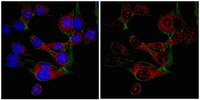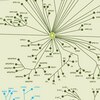06-1363 Sigma-AldrichAnti-SRp30a (SF2) Antibody
Use Anti-SRp30a (SF2) Antibody (rabbit polyclonal antibody) validated in WB, ICC to detect SRp30a (SF2) also known as serine/arginine-rich splicing factor 1, pre-mRNA-splicing factor SF2- P33 subunit, SR splicing factor 1.
More>> Use Anti-SRp30a (SF2) Antibody (rabbit polyclonal antibody) validated in WB, ICC to detect SRp30a (SF2) also known as serine/arginine-rich splicing factor 1, pre-mRNA-splicing factor SF2- P33 subunit, SR splicing factor 1. Less<<Recommended Products
Overview
| Replacement Information |
|---|
Key Specifications Table
| Species Reactivity | Key Applications | Host | Format | Antibody Type |
|---|---|---|---|---|
| H, M, R | WB, ICC | Rb | Purified | Polyclonal Antibody |
| References |
|---|
| Product Information | |
|---|---|
| Format | Purified |
| Control |
|
| Presentation | Purified rabbit polyclonal in buffer containing 0.1 M Tris-Glycine (pH 7.4), 150 mM NaCl with 0.05% sodium azide. |
| Quality Level | MQ100 |
| Physicochemical Information |
|---|
| Dimensions |
|---|
| Materials Information |
|---|
| Toxicological Information |
|---|
| Safety Information according to GHS |
|---|
| Safety Information |
|---|
| Storage and Shipping Information | |
|---|---|
| Storage Conditions | Stable for 1 year at 2-8°C from date of receipt. |
| Packaging Information | |
|---|---|
| Material Size | 100 µL |
| Transport Information |
|---|
| Supplemental Information |
|---|
| Specifications |
|---|
| Global Trade Item Number | |
|---|---|
| Catalog Number | GTIN |
| 06-1363 | 04053252749483 |
Documentation
Anti-SRp30a (SF2) Antibody SDS
| Title |
|---|
Anti-SRp30a (SF2) Antibody Certificates of Analysis
| Title | Lot Number |
|---|---|
| Anti-SRp30a (SF2) - NRG1845789 | NRG1845789 |
| Anti-SRp30a (SF2) -2823606 | 2823606 |
| Anti-SRp30a (SF2) Polyclonal Antibody | 3099488 |

















